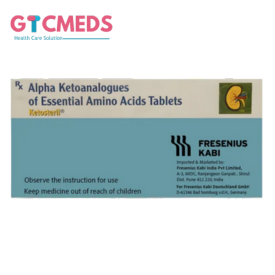Anemia
Showing the single result

What Is Anaemia?
Anaemia is a condition in which the number of red blood cells (RBCs) or the haemoglobin concentration in the blood is lower than normal. The RBCs cannot carry enough oxygen to your body’s tissues.
Types Of Anaemia
The following are the types of anaemia:
- Iron-deficiency anaemia:
It is generally caused by low iron in the body. Poor diet, blood loss, pregnancy, and poor iron absorption are the common reasons for iron deficiency anaemia.
- Vitamin Deficiency Anaemia:
This condition is generally caused due to a lack of folate (Vitamin B9, B12, or both).
- Aplastic anaemia:
In this condition, the bone marrow stops producing enough blood cells. It is generally caused by autoimmune diseases, exposure to toxins, or chemotherapy.
- Haemolytic anaemia:
It is generally caused when the red blood cells are destroyed faster than they are produced.
Sickle cell anemia:
It is a genetic disorder where the RBCs are abnormally shaped like a sickle, causing blockages in blood vessels and premature breakdown of cells.
- Thalassemia:
It is an inherited blood disorder causing defective haemoglobin production and destruction of red blood cells.
What Are The Symptoms Of Anaemia?
The following are the symptoms of anaemia:
- Fatigue or weakness
- Pale or yellowish skin
- Shortness of breath
- Dizziness or lightheadedness
- Cold hands and feet
- Chest pain and rapid heartbeat
- Headaches
- Brittle nails or hair loss
- Cognitive difficulties
Causes And Risk Factors
The following are the major causes of anemia:
Blood loss:
Acute or chronic bleeding reduces the number of red blood cells. The familiar sources of blood loss include:
- Heavy menstrual periods
- Gastrointestinal bleeding
- Trauma or surgery
- Frequent blood donation
- Parasitic infections
Decreased or faulty red blood cell production :
- Iron deficiency :
It is one of the most common causes of anaemia worldwide.
- Vitamin Deficiency :
Vitamin B12 and folate deficiency can lead to poor EBC formation. These are the nutrients that are essential for DNA synthesis in red blood cell production.
- Chronic Diseases:
Diseases such as chronic kidney disease, cancer, HIV/AIDS, or autoimmune disorders can suppress RBC production.
Bone marrow disorders:
- Aplastic anaemia
- Leukaemia
- Myelodysplastic syndromes
Thyroid disorders:
Hypothyroidism can slow down metabolism, including red blood cell production.
Increased Red Blood cell destruction (Haemolytic Anaemia):
This can be inherited or acquired.
Inherited
- Sickle cell anaemia
- Thalassemia
- Hereditary Spherocytosis
Acquired
- Autoimmune haemolytic anaemia
- Infections such as malaria
- Certain medications
- Mechanical heart valves
Proper Diagnosis And Treatment Options For Anaemia
Some of the risk factors for anaemia:
- Poor diet
- Menstruation
- Pregnancy
- Chronic illnesses
- Gastrointestinal conditions
- Family history
- Older age
- Frequent blood donation
- Infections
- Alcoholism
- Low-income populations
Treatment Options
Treatment Options for Anaemia include the following:
Iron-Deficiency Anaemia
- Oral iron supplements (ferrous sulfate, etc.)
- Iron-rich diet (red meat, spinach, legumes, fortified cereals)
- Intravenous (IV) iron if severe or malabsorption
- Blood transfusions in critical cases
Vitamin-Deficiency Anaemia (B12 or Folate Deficiency)
- Vitamin B12 injections or oral supplements
- Folic acid supplements
- Diet rich in B12 (meat, dairy) and folate (leafy greens, beans)
Anaemia of Chronic Disease
- Treat underlying condition (e.g., kidney disease, cancer)
- Use of erythropoiesis-stimulating agents (ESAs)
- Iron or vitamin supplements, if needed
Aplastic Anaemia
- Blood transfusions to manage symptoms
- Immunosuppressive therapy (e.g., ATG, cyclosporine)
- Bone marrow or stem cell transplant (potential cure)
Haemolytic Anaemia
- Treat underlying cause (infections, drugs, autoimmune issues)
- Corticosteroids or immunosuppressive drugs
- Splenectomy in some cases
Sickle Cell Anaemia
- Pain management and hydration
- Folic acid supplements
- Hydroxyurea to reduce sickle cell episodes
- Regular blood transfusions
- Bone marrow transplant (in severe cases)
Thalassemia
- Regular blood transfusions
- Iron chelation therapy to prevent iron overload
- Folic acid supplementation
- Bone marrow or stem cell transplant in selected cases
General Supportive Measures
- Nutritional counseling
- Monitoring of haemoglobin and iron levels
- Avoiding known triggers (e.g., certain medications or foods)
Medication Options for Anaemia Available at GTC Meds
The medication option available at GTC meds for the treatment of Anaemia is Ceriton Epo 10000 IU 1 ml Injection. It is a licensed pharmacy that directly sources its medications from the manufacturers. You can get the medications at affordable rates and discounts.
What Are The Safety Measures?
The following are the safety measures to prevent anemia:
- Eat a healthy, balanced diet
It includes iron-rich foods (meat, leafy greens, beans) and vitamins (B12, folate).
- Take supplements as prescribed:
Only use iron or vitamin supplements if recommended by a doctor.
- Avoid tea or coffee with meals:
These can block iron absorption.
- Get regular check-ups:
You should monitor your haemoglobin and iron levels, especially if you have a chronic illness.
- Treat the root cause:
Try to manage any ongoing health issues like ulcers, heavy periods, or kidney disease.
- Stay hydrated:
Good hydration supports overall health and blood flow.
- Avoid alcohol or limit intake:
Alcohol can affect nutrient absorption and bone marrow function.
- Prevent infections:
Practice good hygiene and stay up to date on vaccinations, especially for those with weak immunity or genetic anaemias.
- Avoid overexertion:
Don’t push your body too hard if you feel tired or weak.
- Follow the doctor’s advice closely:
Especially if you’re undergoing treatment like blood transfusions or taking medications.
-
Sale!

Ketosteril Tablet
$105.60 – $298.90Price range: $105.60 through $298.90 Buy Now This product has multiple variants. The options may be chosen on the product page
